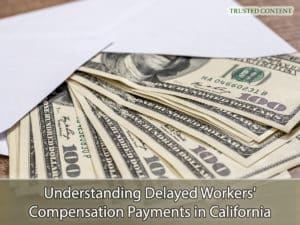Your Rights and Remedies for Delayed Workers’ Comp Payments in Ontario, California
In the aftermath of a workplace injury, timely financial support is crucial for the well-being and recovery of injured workers. California’s workers’ compensation system is designed to provide this support, offering a lifeline to those unable to work due to job-related injuries. However, when workers’ compensation checks are delayed, it can lead to significant financial and emotional stress for injured workers and their families. Understanding your rights and the remedies available to you in the face of such delays is not just empowering—it’s essential for ensuring you receive the benefits you’re entitled to under California law.

Understanding Delayed Workers’ Compensation Payments in California
Understanding Delayed Workers’ Compensation Payments in California
Workers’ compensation in California is a no-fault system intended to quickly and efficiently provide financial assistance and medical care to workers injured on the job. This system is designed to help injured workers recover and return to work as soon as possible. However, the process doesn’t always go smoothly. Delays in receiving workers’ compensation checks can create a domino effect, leading to unpaid bills and added stress during a time when the focus should be on recovery. Knowing the specifics of California labor codes and the penalties for late payments can arm you with the information needed to navigate these challenges.
Key California Labor Codes for Late Workers’ Comp Payments
California labor codes 4650 and 5814 play pivotal roles in ensuring timely payments to injured workers. These codes are designed to penalize insurance companies that fail to make payments within the stipulated time frames, thereby encouraging adherence to payment schedules.
Labor Code 4650: Ensuring Timely Disability Payments
Labor Code 4650 addresses temporary and permanent disability payments, mandating a 10% penalty on late payments. This code is a critical component of the workers’ compensation system, as it directly impacts the financial stability of injured workers. Temporary disability benefits are typically due 14 days after the employer is notified of the injury, and permanent disability benefits commence six months after the injury is classified as permanent. The imposition of a penalty for late payments under this code serves as a deterrent against unnecessary delays, ensuring that injured workers receive their benefits in a timely manner.
Labor Code 5814: Addressing Unreasonable Payment Delays
Labor Code 5814 takes the enforcement of timely payments a step further by focusing on unreasonable delays in the disbursement of benefits. This code allows for penalties of up to 25% on the amount owed, with the exact penalty often determined by a judge. The application of this penalty is contingent upon the insurance company’s failure to make timely payments and the absence of a reasonable excuse for the delay. The dual penalty system under Codes 4650 and 5814 underscores California’s commitment to protecting the rights of injured workers and ensuring they receive the financial support they need without undue delay.
Identifying Unreasonable Delays
Determining what constitutes an unreasonable delay is not always straightforward. The law provides judges with the discretion to assess the circumstances surrounding each case, including the length of the delay, the reasons behind it, and the insurance company’s efforts to rectify the mistake. A delay might be deemed unreasonable if it results from negligence or a willful disregard for the payment schedule, whereas a brief delay caused by a clerical error may not meet this threshold. Understanding these nuances is crucial for injured workers who believe they are entitled to additional penalties due to late payments.

Steps to Claim a Penalty for Late Workers’ Comp Payments
Steps to Claim a Penalty for Late Workers’ Comp Payments
If you suspect that your workers’ compensation payments are being delayed, the first step is to notify the insurance company in writing. This notification should not only highlight the delay but also explicitly claim the penalty under Labor Code 5814. Failing to claim the penalty could provide the insurance company with an opportunity to correct the mistake without incurring additional costs. It’s important to document all communications with the insurance company, as this documentation can be invaluable if the issue escalates to a legal dispute.
When to Seek Legal Assistance
While many issues related to delayed workers’ compensation payments can be resolved through direct communication with the insurance company, there are instances where legal intervention becomes necessary. If you’re facing significant delays, or if the insurance company disputes your claim, consulting with a workers’ compensation attorney can be a wise decision. An experienced attorney can navigate the complexities of California’s workers’ compensation laws, advocate on your behalf, and help ensure that you receive the full benefits you’re entitled to.

Your Rights and Remedies for Delayed Workers’ Comp Payments in Ontario, California
Your Rights and Remedies for Delayed Workers’ Comp Payments in Ontario, California
Dealing with delayed workers’ compensation payments can be a frustrating and stressful experience, but you don’t have to navigate this challenge alone. Understanding your rights under California law and the remedies available to you is the first step toward securing the benefits you deserve. If you’re experiencing delays in receiving your workers’ compensation benefits, take action now. Contact Napolin Accident Injury Lawyer at (909) 962-8415 for a free consultation. Our team has extensive litigation experience in workers’ compensation cases, and we’re committed to fighting for the rights of injured workers across California. Let us help you secure the timely financial support you need to focus on your recovery.
